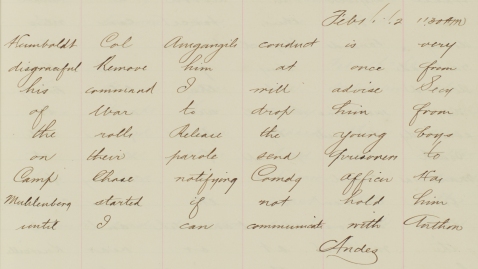The Mystery of Colonel Amgangil – Solved?!

Perhaps you remember the case of the curiously named “Col Amgangil”, who was being decried in a previous post? What with the other aspects of my job, I don’t have much time to devote to tracking down the interesting little tidbits that crop up fairly regularly. Fortunately, rock star historian Daniel Stowell decided to tease out this particular quandary (as well as help me realize that I transcribed the date incorrectly – oops!). He posits that “Amgangil” is a mangling of “Anisansel” referring to Henry Anisansel, a French-Swiss music teacher who served in the Union’s 1st West Virginia Cavalry Regiment (originally the First Virginia Cavalry, a “loyal Virginia” regiment). The name is also spelled, confusingly, “Anisanel”, “Annisansel” and “Amsanzel” at times, confirming that the 19th century was not the pinnacle of regularized orthography!
The Colonel was accused of cowardice or misbehavior before to enemy for his actions at Bloomery Gap, West Virginia, by General Lander. The skirmish occurred on February 14th, but by the 27th Anisansel was already acquitted of wrongdoing at a court martial. I asked Stowell if that kind of speedy turnaround was common and he answered that it was not, but it may have been a result of concerns at the highest levels of command that breakdowns in discipline among the officers of the volunteer army could seriously hinder the Union’s success. Secretary of War Edwin Stanton responded to Lander’s request for advice strongly, noting that “Cowardice in an officer exhibited on the field of battle should receive the swift punishment of death.”
Other evidence of Anisansel’s travails has survived, including the telegram that he sent to Governor Pierpont of West Virginia, reporting on the start of his trial, and an account of the Bloomery Gap incident based on reports and trial records is detailed in Frederick W. Lander: The great natural American soldier, by Gary L. Ecelbarger (2000). Given both Lander and Stanton’s unforgiving attitudes, how did Anisansel fare? Accounts demonstrate a reluctance on his part to join battle with the enemy at Bloomery Gap, but the star witness for the prosecution was laid up in a hospital in Cumberland, and Anisansel was able to point to a hernia that had ruptured in a fall on the road as a mitigating circumstance. He was found not guilty without having to call any witnesses. In a twist of fate, it was actually his commanding officer, F.W. Lander, who would die soon, succumbing to pneumonia on March 2nd, only a few weeks after the trial ended. Anisansel would later resign from the army, in August of 1862.
There are so many ways that the results of Decoding the Civil War will augment our understanding of the U.S. Civil War, and we are only scratching the surface at this point. Thanks to Daniel’s help, we now know that “Humboldt” was an arbitrary for Lander in one of the codebooks that has not survived in our collection. Given his early death, Lander was probably dropped from most of the later codes, but by using contextual clues like this we hope to be able to reconstruct those lost ciphers.

Any idea who the “young boys” were, and why they were arrested?
LikeLike
I can’t say for sure, but I would suspect that it is some of the Confederate soldiers taken prisoner at Bloomery Gap.
LikeLike